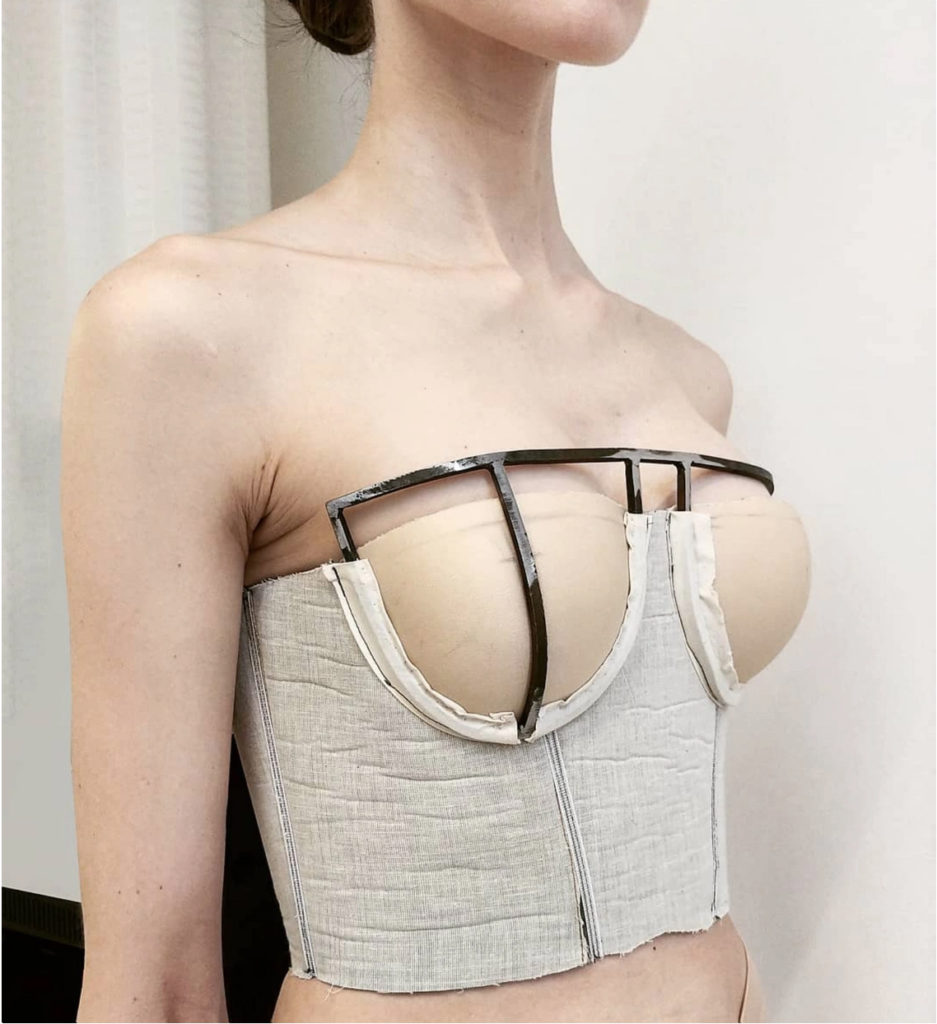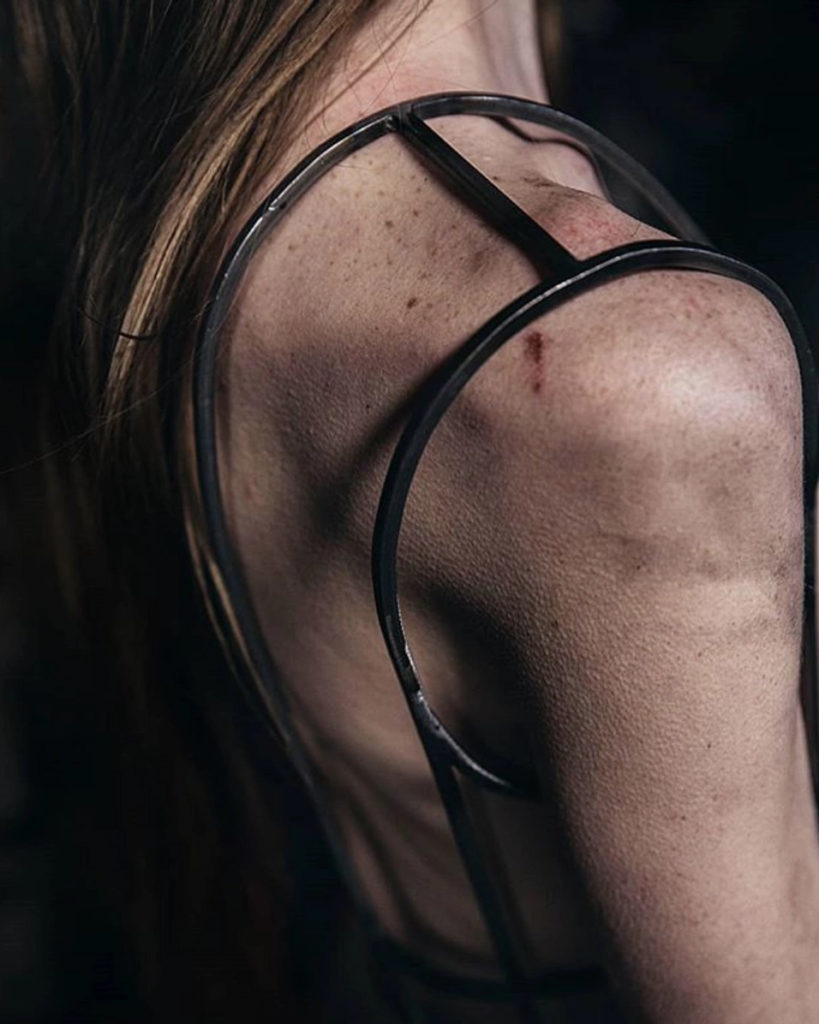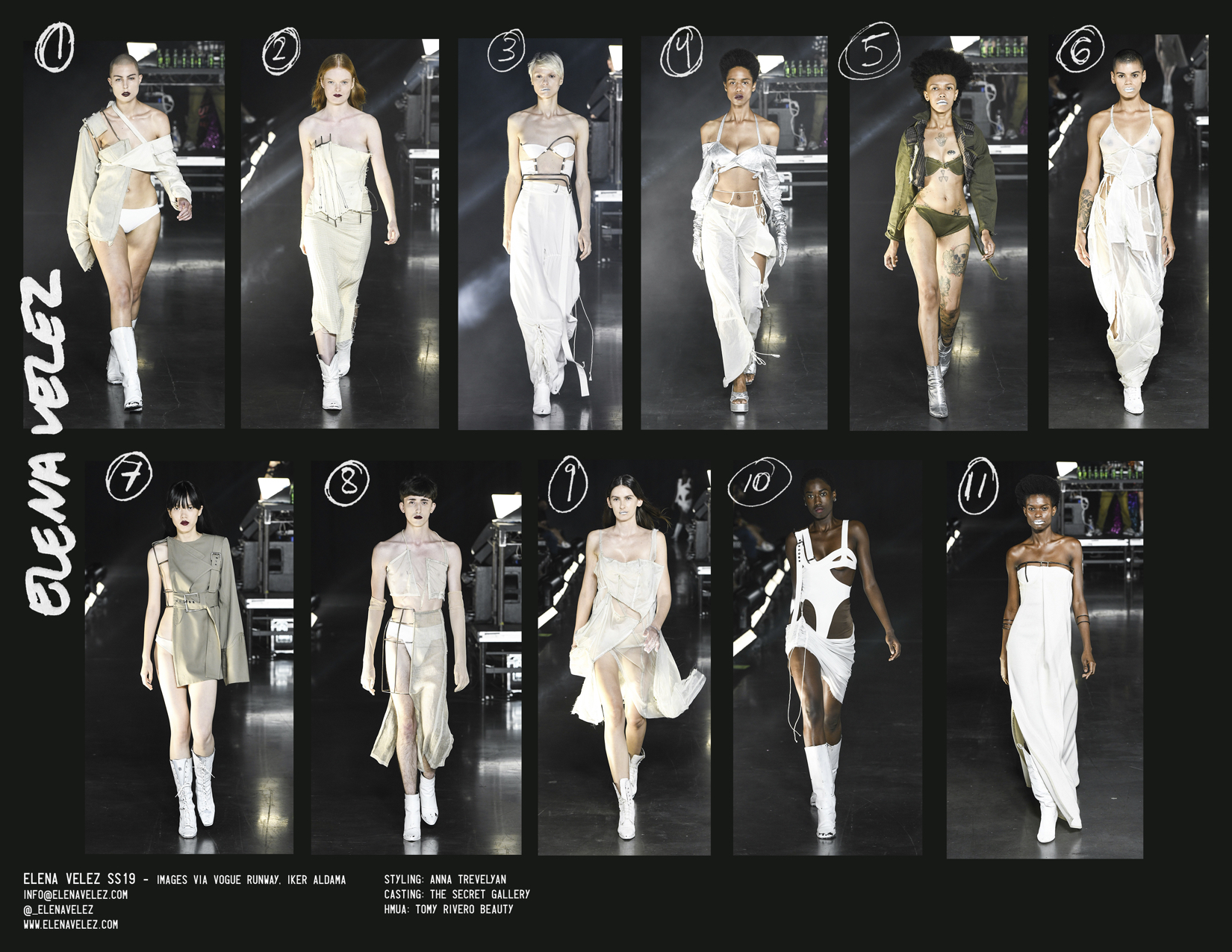Elena Velez, 26, is on the rise with her self-titled clothing line that takes a sustainable, utilitarian spin on industrial fashion. Elena Velez established her brand in 2018, the year she graduated from Parsons. Some garments by Elena Velez feature reconstructed steel beams from boats in Lake Michigan, forming structured bodices, reconfigured suit dresses and flowing skirts in a neutral color pallet. Her most recent collection titled “Homecoming,” released for Spring/Summer 2020, promotes the idea of strength, durability and power with unconventional, feminine designs.
Elena Velez has been preparing for a fashion revolution, and her designs speak truth to that. Her militaristic designs made with sustainable materials make it apparent that Elena Velez has a vision for the future, and wants to take us there.
Emily Pavis: How do you express yourself through the clothes you make?
Elena Velez: I grew up in Milwaukee, Wisconsin as the only child of a single mother who worked as a ship captain. My childhood was spent in spaces that were industrial and utilitarian — shipyards, docks, engine rooms. I’m sure it has influenced my aesthetic. [My mother’s] strength, independence and unconventional femininity have inspired me as a person and a designer. The ability to communicate this experience and perspective feels personal yet universal.
Emily Pavis: How did you learn your skills?
Elena Velez: Most skill-based learning comes in practical application. You learn the tricks and shortcuts after taking the long way a hundred times. The pursuit of knowledge doesn’t always have to be an external search. I think there’s a world of information within us at all times. Sometimes it takes reading a book, watching a movie, seeing an exhibition to trigger the start of your next story, exploration, or question.
Emily Pavis: How do you practice sustainability in your designs?
Elena Velez: The sustainability component of my brand is not a sales pitch or a special feature. It’s an essential and non-negotiable reality of creating a product in the world today. Treating the conversation on sustainability like a trend is irresponsible. What I’d like to do with my brand is to continue to interpret sustainably ingenious techniques into my designs. I imagine each collection as a discovery of a new bank of techniques that roll over into the next season and ultimately become the codes of my brand. It’s important to me to offer something of merit to the industry and not to enjoy a comfortable, yet self-congratulatory, career as someone who makes pretty garments for rich people.

Emily Pavis: How have you been impacted by the COVID-19 pandemic? Has your brand been impacted at all? What have you been doing during the lockdown?
Elena Velez: It’s given me an opportunity and parameter to prepare for the industry we all knew was coming — decentralized, virtual, more democratic. I’m ready for the change and want to be a voice of this new industry. In lockdown, I’ve been reorienting, rebuilding, and considering anew to be ready for the window of opportunity and the creative renaissance that is soon to come.
Emily Pavis: Who are some of the most influential people that have worn your designs publicly?
Elena Velez: Solange Knowles, Grimes, Charli XCX, Arca, Lil Miquela, Brooke Candy, Kim Petras, Charlotte Lawrence, and Caroline Polachek. Recent collaborations include custom tour looks for music artists such as Kali Uchis, Ariana Grande, and Halsey.
Emily Pavis: Was there a course at Parsons that was particularly inspiring?
Elena Velez: My favorite course was called Time, taught in foundation year at Parsons Paris — it was all about time-based media and how process and medium can also add significance and authenticity to a final product.
Emily Pavis: What was the most significant thing you learned in college?
Elena Velez: The most significant thing I learned in college was how to ask better questions of myself and of my work: Critical creative thinking, which is a skill I apply so much outside of school. I think a lot of students enter design or art school with their own questions they want mentors and instructors to answer and become frustrated when they are met with another question. It’s about evolution and process, not finality.
Emily Pavis: What is your goal with your designs?
Elena Velez: A technique or a trend that leads to a small change in how we make or design things. Maybe a piece that sparks a conversation that leads to a new friendship. Maybe a thing that makes someone challenge themselves to think about something differently. I think there’s equal beauty in the tiny interactions and outward vibrations that occur when something new is manifested. I just want those vibrations to be positive, responsible and progressive.

Emily Pavis: Do you have any advice for fashion design majors?
Elena Velez: You need entrepreneurial endurance. It’s imperative to cultivate other skills in business development, communication, financial management and social skills in navigating the industry. The “book smart” approach to fashion is a third of the experience and will take you triple the time to get to the same point as the design student who jumped right in and got hands-on, practical application. I wasted a lot of time using school as a safe space/alibi for why I wasn’t engaging with the industry – out of insecurity. I spent a lot of time and a lot of money in the process. Fashion school is a business that makes its money by selling you the dream that you could be next. The industry post-graduation owes you no such acknowledgment. If challenge and the very real possibility of failure is scary to you, fashion might not be the best career. If it’s scary in a thrilling way that gives you energy, keep pushing!







